Key takeaways:
- Understanding cryptocurrency involves grasping blockchain technology and the innovative shift towards decentralized finance (DeFi).
- Emotional awareness is crucial for making rational trading decisions, managing fear and greed effectively.
- Adopting stress management strategies, such as mindfulness and community support, enhances resilience in trading.
- Building a positive mindset through learning, gratitude, and viewing losses as lessons can transform trading experiences.
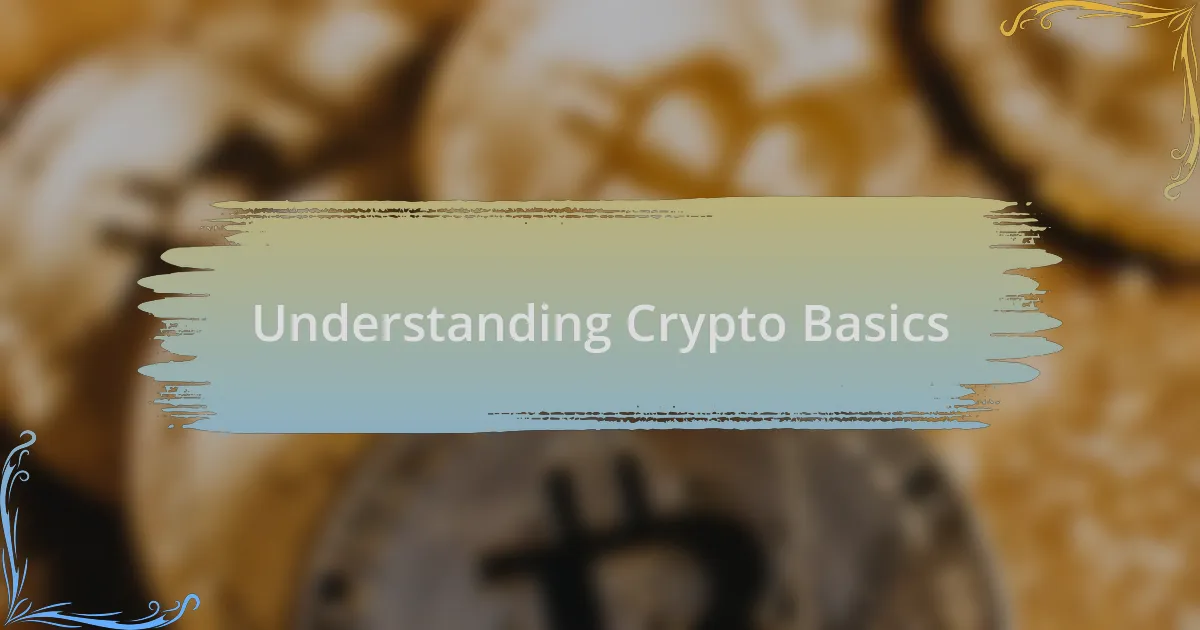
Understanding Crypto Basics
Understanding cryptocurrency starts with grasping what it actually is. At its core, crypto is a type of digital money that uses technology called blockchain to secure transactions. I still remember the first time I explained this to a friend who thought blockchain was just another tech buzzword—seeing their eyes light up as the concept clicked was a rewarding moment.
You might wonder, why does crypto matter? It’s not just about making money; it’s about innovation in how we handle transactions and data. I once found myself lost in the intricacies of how decentralized finance (DeFi) works, and it dawned on me how revolutionary this could be. Instead of relying on banks, people can directly trade or lend money—there’s a certain thrill in being part of this shift.
Additionally, understanding key terms can make a world of difference. For instance, wallets are where you store your cryptocurrency, similar to how you use a physical wallet for cash. I recall feeling a mix of excitement and confusion when I first set up my digital wallet—realizing I was taking my first step into the crypto world was such a strange yet exciting emotion.
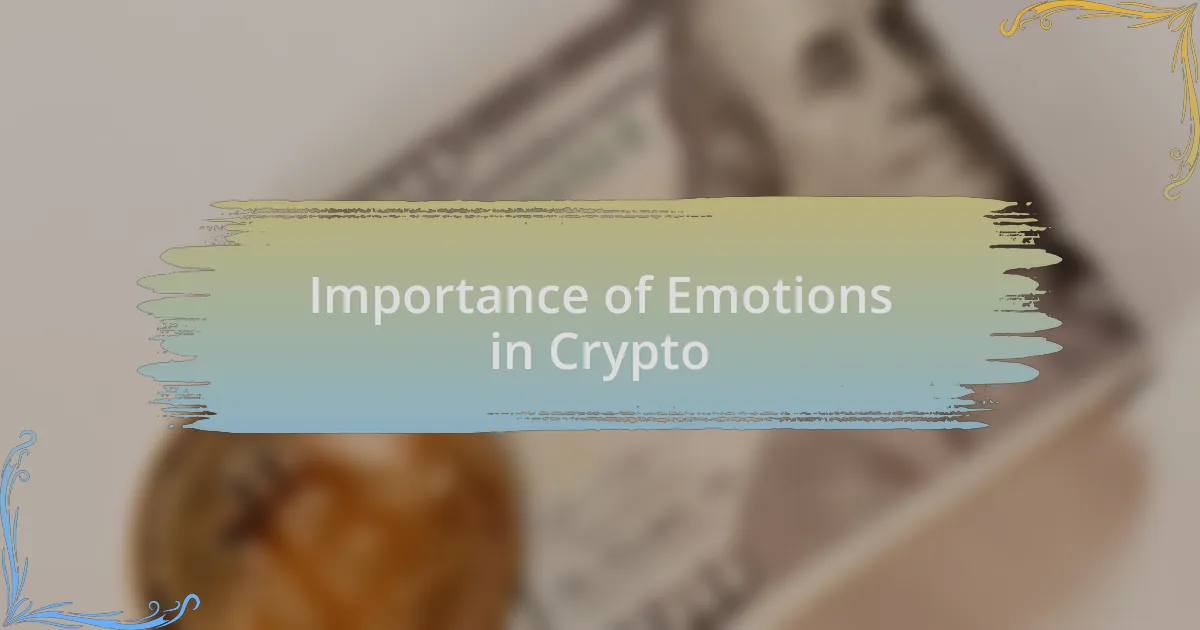
Importance of Emotions in Crypto
Emotions play a crucial role in navigating the volatile world of cryptocurrency. I’ve experienced firsthand how fear can lead to rash decisions, like selling coins during a market dip because I was worried about losing money. It’s surprising how quickly one can react and miss out on potential gains simply because of emotional turmoil.
On the flip side, I’ve also felt the exhilaration that comes with taking calculated risks when the market is on an upswing. There’s this burst of confidence that makes me want to invest more, almost like riding a thrilling wave. But let me tell you, that excitement can cloud your judgment, and it’s essential to find the balance between passion and rational thinking.
Recognizing my emotions while trading has transformed my approach. Instead of letting fear or greed dictate my decisions, I focus on a clear strategy and set goals. Have you ever felt that rush of adrenaline when a trade hits just right? That feeling is absolutely captivating, but it taught me the importance of staying grounded. Managing emotions in crypto is not just about making money; it’s about understanding myself and how I react in this fast-paced environment.
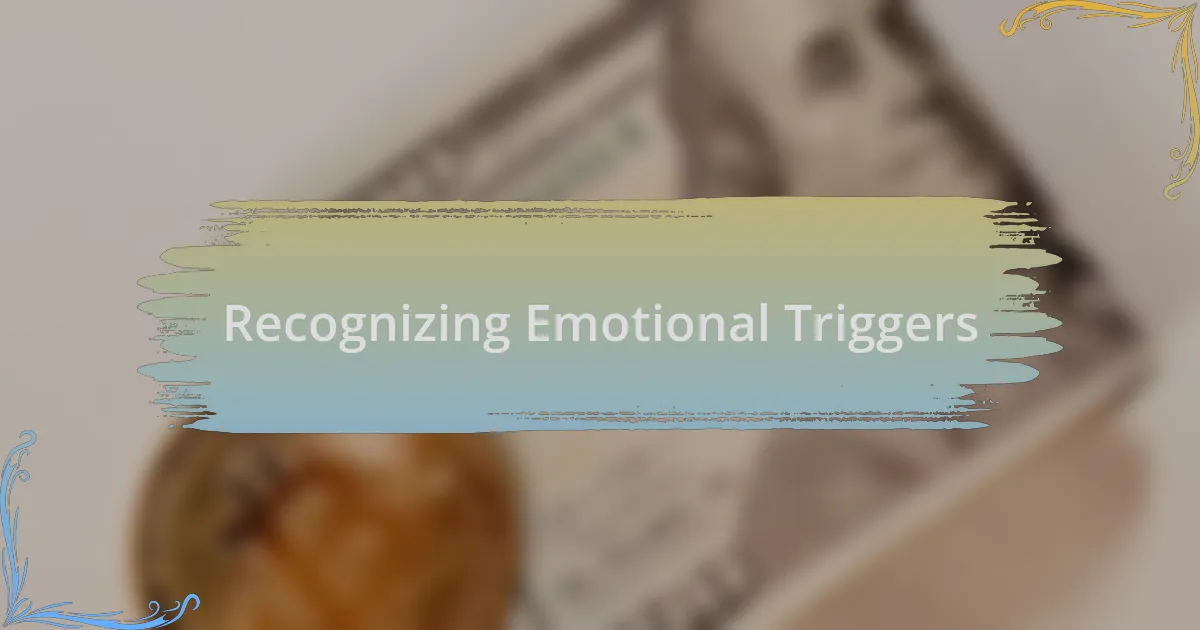
Recognizing Emotional Triggers
When I first started trading, I didn’t realize how much my excitement could blind me. I remember one time, after a significant gain, I felt invincible and started investing more than I should have. It was like a sugar rush, and when the market took a downturn, I was left scrambling, questioning my decisions. What if I had recognized that emotional high earlier?
It’s fascinating to see how specific events trigger different feelings. For me, a sudden price surge often brings joy, while a sharp decline instantly sparks anxiety. I’ve learned to pause and identify these triggers instead of reacting impulsively. Have you ever noticed how the news can shift your mood in an instant? That awareness has been key—knowing what makes me tick helps me navigate those emotional waves more effectively.
Recognizing emotional triggers isn’t just about self-awareness; it’s about creating a game plan that incorporates those emotions. For instance, I started journaling my thoughts during trading sessions to pinpoint what moved me in different situations. It’s like having a roadmap to guide my decisions, rather than wandering through a fog of feelings. Isn’t it amazing how understanding our emotions can not only help in trading but also in life overall?

Strategies to Manage Stress
Finding healthy outlets for stress is crucial in my crypto journey. I’ve found that taking breaks really helps me clear my mind. One time, after a frustrating day of watching my investments plummet, I decided to go for a walk in the park. The fresh air and change of scenery transformed my perspective completely. Have you ever noticed how stepping away from a situation can make everything seem less daunting?
Mindfulness techniques have also become a cornerstone of my stress management. When I sit quietly and focus on my breath, it feels like I’m pulling the reins on my racing thoughts. I remember during one particularly volatile trading period, I practiced deep breathing for just a few minutes. I began to feel a sense of calm wash over me, allowing me to return to my decisions with a clearer head. Doesn’t it make sense that a few moments of stillness can dramatically shift our mindset?
Creating a supportive community has played a significant role in managing my stress as well. I started chatting with fellow traders online, sharing experiences and coping strategies. One evening, after a tough market day, I joined a discussion and realized I wasn’t alone in facing these challenges. Hearing someone else’s story helped me process my feelings. Have you tried connecting with others who share your interests? Building this network has not only eased my stress but also enriched my overall experience in crypto trading.
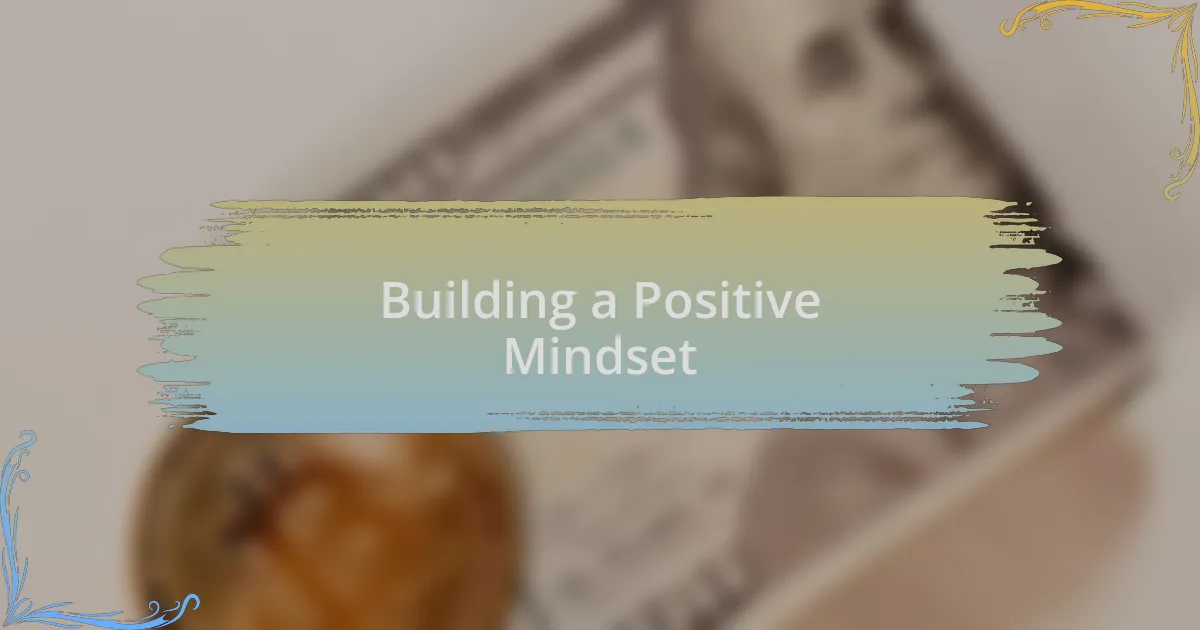
Building a Positive Mindset
Building a positive mindset is essential in navigating the unpredictable world of crypto. I’ve discovered that focusing on what I can control—like improving my knowledge about market trends—helps me feel empowered rather than overwhelmed. I recall a time when I decided to dive into tutorials and podcasts to expand my understanding. That shift in perspective turned my anxiety into curiosity, and it significantly changed how I approach my investments. Isn’t it interesting how learning can transform our outlook?
Gratitude has also been a game-changer for my mindset. I began keeping a simple journal where I jot down accomplishments, big or small, related to my crypto journey. I remember one day, I noted that I prevented an impulsive decision by taking a moment to reflect. Recognizing these wins helps me appreciate the progress I’m making, even during tough times. Have you ever taken a moment to celebrate your own achievements?
Lastly, embracing a growth mindset has been vital. I’ve learned that each loss is an opportunity for a lesson. After a particularly rough trading day, instead of succumbing to frustration, I chose to analyze what went wrong. That moment of reflection turned a negative experience into a valuable learning point. How often do we allow setbacks to discourage us rather than inspire growth? Shifting this mindset has transformed my entire approach to crypto.
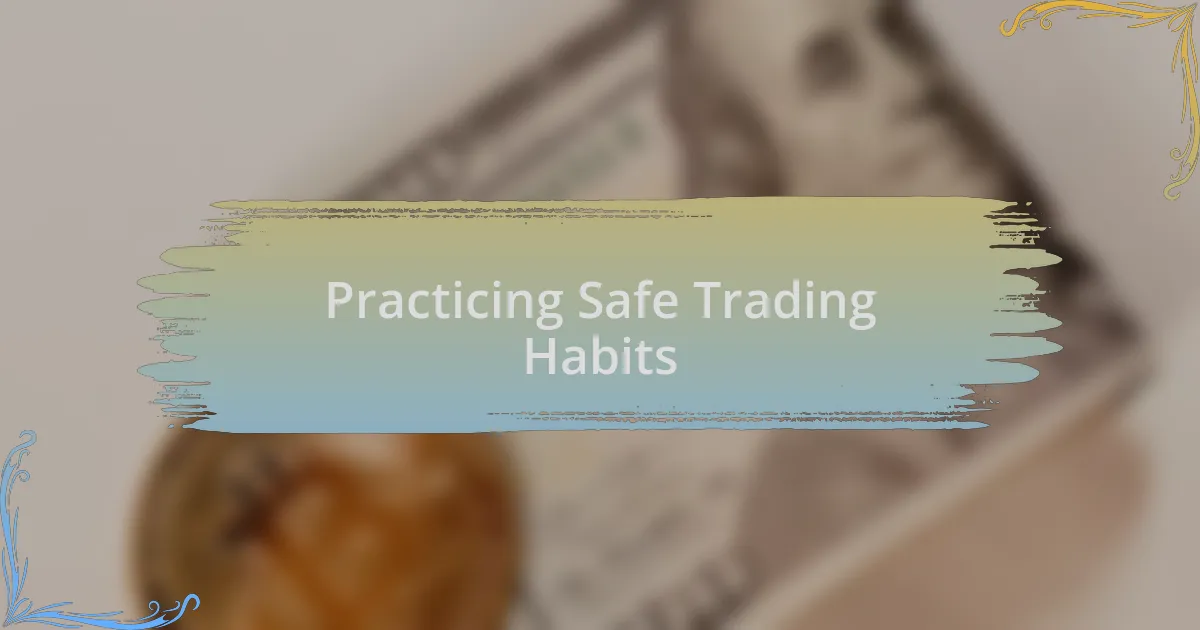
Practicing Safe Trading Habits
Practicing safe trading habits is something I take seriously. One key approach I’ve adopted is setting strict rules for myself, like only investing what I can afford to lose. I learned this the hard way after a moment of impatience led me to invest a portion of my savings into a project that ultimately failed. Looking back, I wish I’d had stronger boundaries to protect myself emotionally and financially. Have you ever felt the sting of a hasty decision?
I also make it a point to avoid chasing trends. I remember the excitement of seeing a particular coin skyrocket and how it tempted me to jump in without doing my homework. That experience taught me the importance of thorough research, not just riding the wave of excitement. It’s like a rollercoaster—sure, the thrill is addictive, but a bit of caution can save you from that jarring drop. Isn’t it fascinating how careful planning can relieve that urge to act impulsively?
Lastly, I’ve implemented a daily check-in with my emotions before I begin trading. Taking a moment to assess how I’m feeling—whether anxious, excited, or even bored—helps ground me. I recall a day when I felt a wave of stress before hitting the market; I paused and took a deep breath instead of diving in. That simple habit can be the difference between making a wise decision and falling into panic trading. Have you ever considered how your emotional state influences your trading decisions?
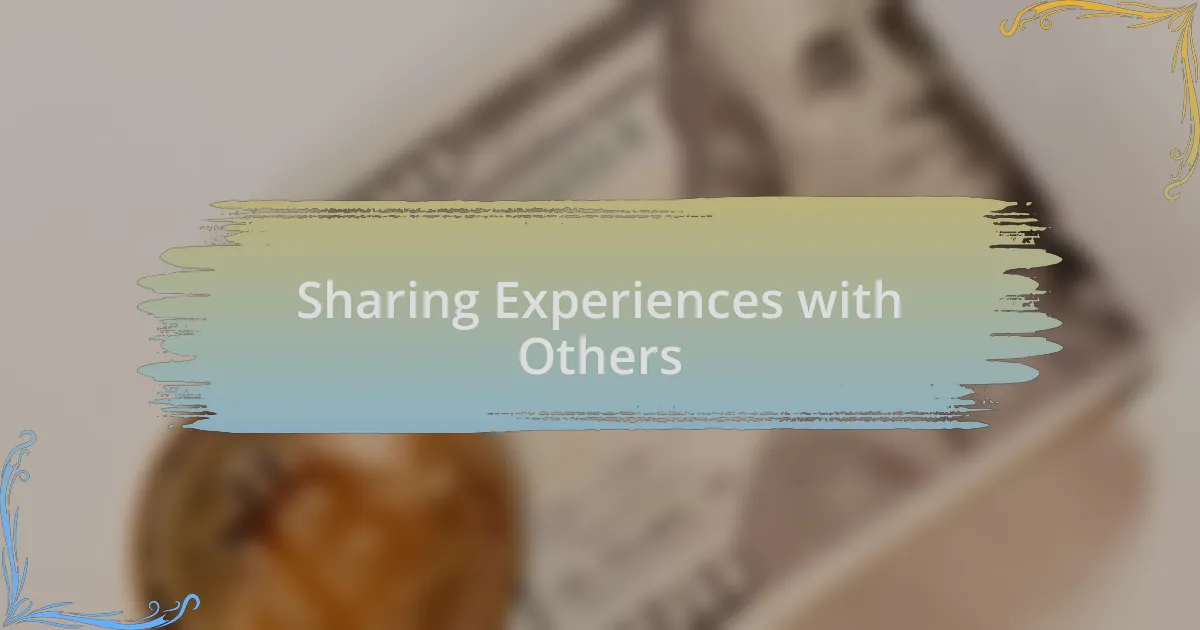
Sharing Experiences with Others
Sharing experiences with others has been a game-changer for me. I often find solace in talking to friends who are also into crypto. There was a particular time when I felt overwhelmed and stressed after a market drop. Venting to a buddy allowed me to put my worries in perspective. Have you ever noticed how a simple conversation can make even the toughest situations feel lighter?
Engaging with online communities has also broadened my understanding of crypto emotions. In one forum, I shared my hesitations about investing during a market surge. To my surprise, many others felt the same. It was comforting to realize that I wasn’t alone in my fears, and sometimes, just knowing others are on a similar journey can be incredibly reassuring. Have you found spaces where you can voice your concerns?
I’ve also learned that sharing isn’t just about expressing fears but celebrating victories too. After a successful trade, I shared my thoughts with a group of fellow traders. The joy we all felt created a sense of belonging I hadn’t anticipated. Celebrating these little wins together actually helps to cultivate a positive atmosphere around trading, which can lift everyone’s spirits during tougher times. Have you experienced the power of sharing wins with others?